Importance of Interpersonal Communication Skills in Labs
VerifiedAdded on 2022/11/25
|6
|1508
|422
Essay
AI Summary
This essay examines the critical role of interpersonal communication skills – listening, questioning, and feedback – in a laboratory setting. The introduction emphasizes the importance of these skills, often referred to as soft skills, in navigating workplace challenges and fostering clear communication. The essay then delves into the significance of active listening, detailing its importance in understanding both verbal and non-verbal cues, and its benefits for technicians in interacting with colleagues and patients. It highlights how conscious listening encourages analysis and informed judgments. The essay also explores the skill of questioning, showcasing its value in clarifying understanding and encouraging engagement, drawing on research to support its impact on communication dynamics. The benefits of questioning, such as fostering a collaborative environment, are emphasized. Finally, the essay discusses the importance of feedback as a key component of interpersonal communication, analyzing its role in improving teamwork and overall outcomes. Both formal and informal feedback mechanisms are considered. The essay concludes by reiterating the essential nature of these skills for laboratory technicians to achieve both individual and group success, emphasizing the need for experienced colleagues to facilitate skill development.
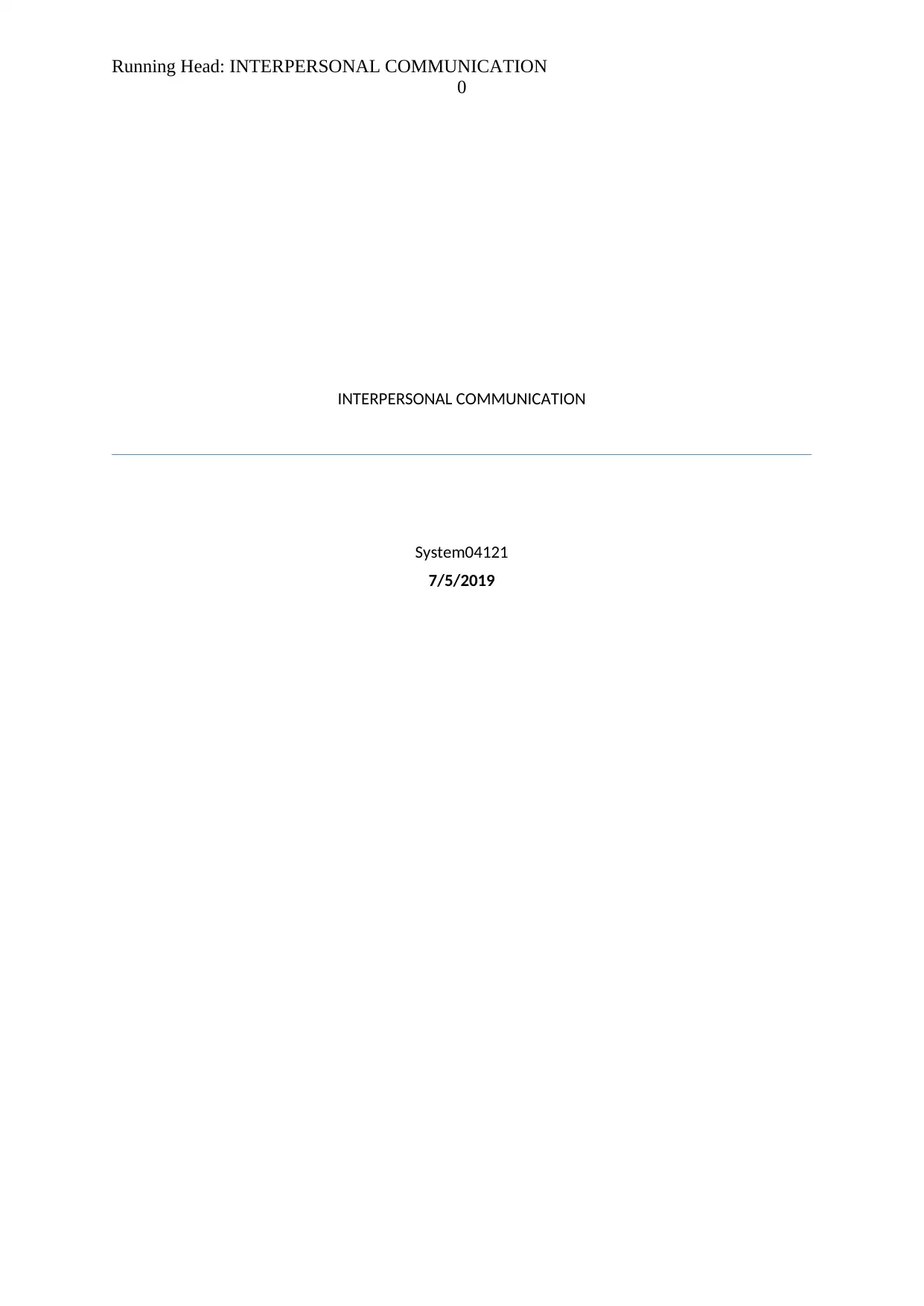
Running Head: INTERPERSONAL COMMUNICATION
0
INTERPERSONAL COMMUNICATION
System04121
7/5/2019
0
INTERPERSONAL COMMUNICATION
System04121
7/5/2019
Paraphrase This Document
Need a fresh take? Get an instant paraphrase of this document with our AI Paraphraser
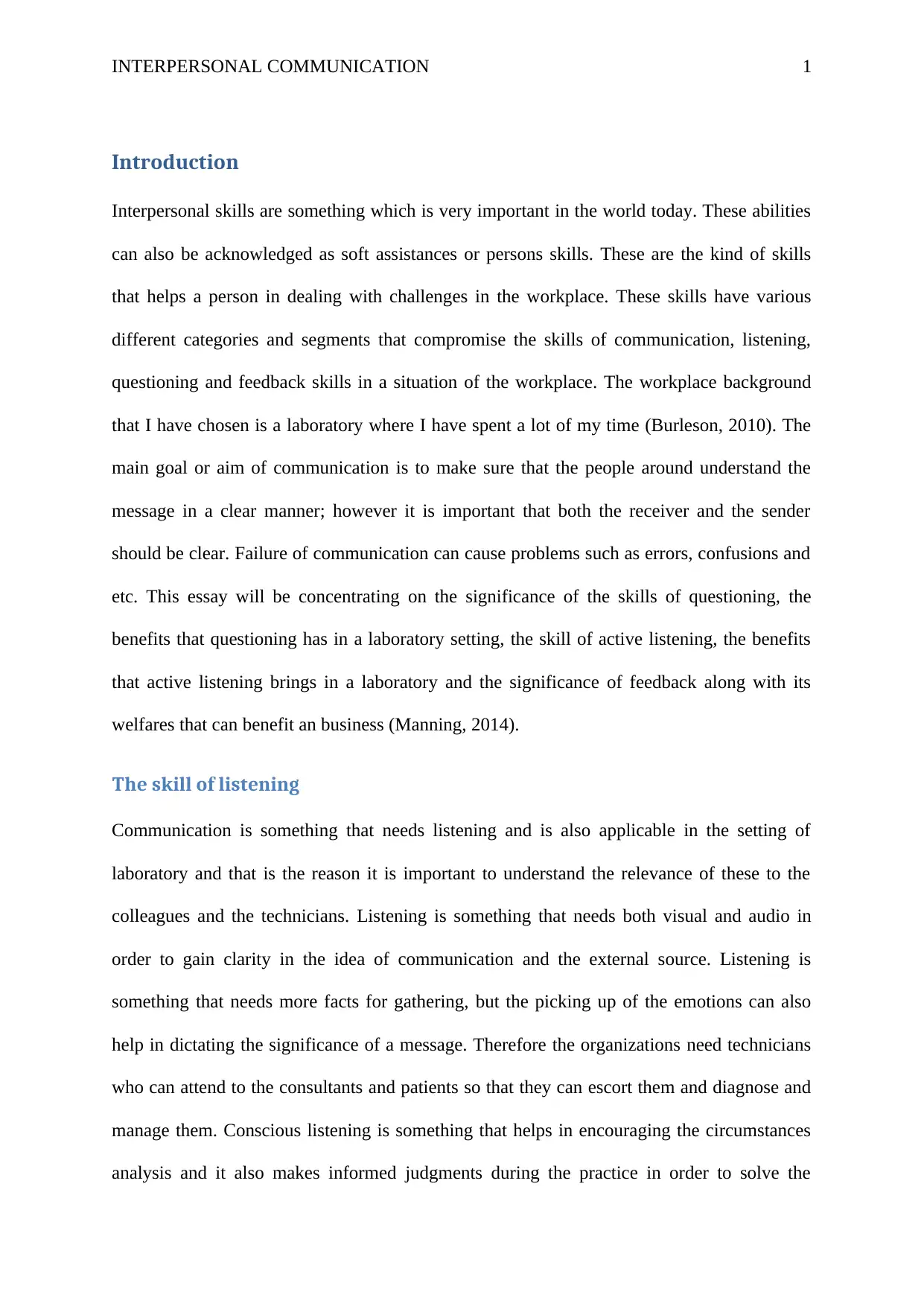
INTERPERSONAL COMMUNICATION 1
Introduction
Interpersonal skills are something which is very important in the world today. These abilities
can also be acknowledged as soft assistances or persons skills. These are the kind of skills
that helps a person in dealing with challenges in the workplace. These skills have various
different categories and segments that compromise the skills of communication, listening,
questioning and feedback skills in a situation of the workplace. The workplace background
that I have chosen is a laboratory where I have spent a lot of my time (Burleson, 2010). The
main goal or aim of communication is to make sure that the people around understand the
message in a clear manner; however it is important that both the receiver and the sender
should be clear. Failure of communication can cause problems such as errors, confusions and
etc. This essay will be concentrating on the significance of the skills of questioning, the
benefits that questioning has in a laboratory setting, the skill of active listening, the benefits
that active listening brings in a laboratory and the significance of feedback along with its
welfares that can benefit an business (Manning, 2014).
The skill of listening
Communication is something that needs listening and is also applicable in the setting of
laboratory and that is the reason it is important to understand the relevance of these to the
colleagues and the technicians. Listening is something that needs both visual and audio in
order to gain clarity in the idea of communication and the external source. Listening is
something that needs more facts for gathering, but the picking up of the emotions can also
help in dictating the significance of a message. Therefore the organizations need technicians
who can attend to the consultants and patients so that they can escort them and diagnose and
manage them. Conscious listening is something that helps in encouraging the circumstances
analysis and it also makes informed judgments during the practice in order to solve the
Introduction
Interpersonal skills are something which is very important in the world today. These abilities
can also be acknowledged as soft assistances or persons skills. These are the kind of skills
that helps a person in dealing with challenges in the workplace. These skills have various
different categories and segments that compromise the skills of communication, listening,
questioning and feedback skills in a situation of the workplace. The workplace background
that I have chosen is a laboratory where I have spent a lot of my time (Burleson, 2010). The
main goal or aim of communication is to make sure that the people around understand the
message in a clear manner; however it is important that both the receiver and the sender
should be clear. Failure of communication can cause problems such as errors, confusions and
etc. This essay will be concentrating on the significance of the skills of questioning, the
benefits that questioning has in a laboratory setting, the skill of active listening, the benefits
that active listening brings in a laboratory and the significance of feedback along with its
welfares that can benefit an business (Manning, 2014).
The skill of listening
Communication is something that needs listening and is also applicable in the setting of
laboratory and that is the reason it is important to understand the relevance of these to the
colleagues and the technicians. Listening is something that needs both visual and audio in
order to gain clarity in the idea of communication and the external source. Listening is
something that needs more facts for gathering, but the picking up of the emotions can also
help in dictating the significance of a message. Therefore the organizations need technicians
who can attend to the consultants and patients so that they can escort them and diagnose and
manage them. Conscious listening is something that helps in encouraging the circumstances
analysis and it also makes informed judgments during the practice in order to solve the
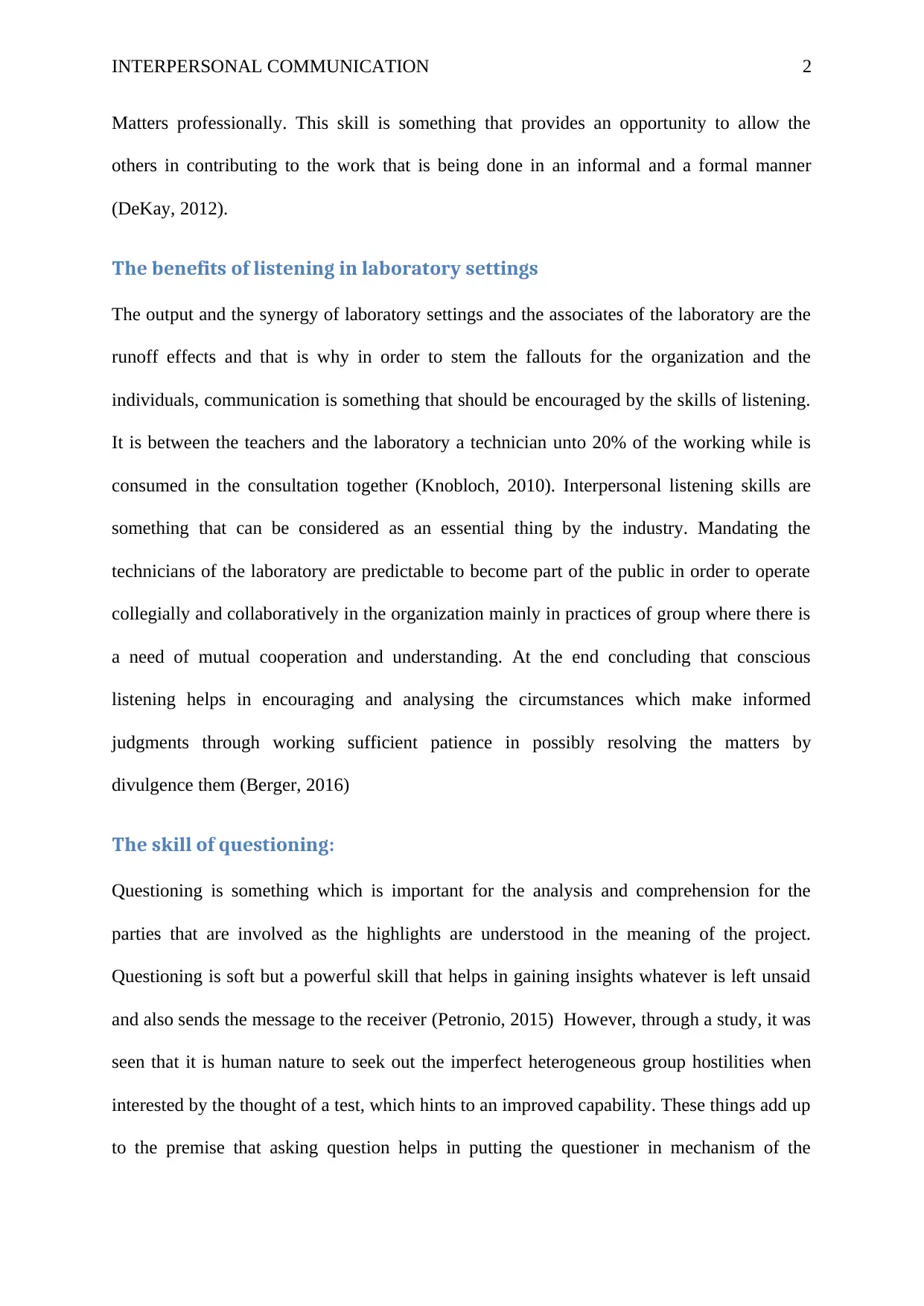
INTERPERSONAL COMMUNICATION 2
Matters professionally. This skill is something that provides an opportunity to allow the
others in contributing to the work that is being done in an informal and a formal manner
(DeKay, 2012).
The benefits of listening in laboratory settings
The output and the synergy of laboratory settings and the associates of the laboratory are the
runoff effects and that is why in order to stem the fallouts for the organization and the
individuals, communication is something that should be encouraged by the skills of listening.
It is between the teachers and the laboratory a technician unto 20% of the working while is
consumed in the consultation together (Knobloch, 2010). Interpersonal listening skills are
something that can be considered as an essential thing by the industry. Mandating the
technicians of the laboratory are predictable to become part of the public in order to operate
collegially and collaboratively in the organization mainly in practices of group where there is
a need of mutual cooperation and understanding. At the end concluding that conscious
listening helps in encouraging and analysing the circumstances which make informed
judgments through working sufficient patience in possibly resolving the matters by
divulgence them (Berger, 2016)
The skill of questioning:
Questioning is something which is important for the analysis and comprehension for the
parties that are involved as the highlights are understood in the meaning of the project.
Questioning is soft but a powerful skill that helps in gaining insights whatever is left unsaid
and also sends the message to the receiver (Petronio, 2015) However, through a study, it was
seen that it is human nature to seek out the imperfect heterogeneous group hostilities when
interested by the thought of a test, which hints to an improved capability. These things add up
to the premise that asking question helps in putting the questioner in mechanism of the
Matters professionally. This skill is something that provides an opportunity to allow the
others in contributing to the work that is being done in an informal and a formal manner
(DeKay, 2012).
The benefits of listening in laboratory settings
The output and the synergy of laboratory settings and the associates of the laboratory are the
runoff effects and that is why in order to stem the fallouts for the organization and the
individuals, communication is something that should be encouraged by the skills of listening.
It is between the teachers and the laboratory a technician unto 20% of the working while is
consumed in the consultation together (Knobloch, 2010). Interpersonal listening skills are
something that can be considered as an essential thing by the industry. Mandating the
technicians of the laboratory are predictable to become part of the public in order to operate
collegially and collaboratively in the organization mainly in practices of group where there is
a need of mutual cooperation and understanding. At the end concluding that conscious
listening helps in encouraging and analysing the circumstances which make informed
judgments through working sufficient patience in possibly resolving the matters by
divulgence them (Berger, 2016)
The skill of questioning:
Questioning is something which is important for the analysis and comprehension for the
parties that are involved as the highlights are understood in the meaning of the project.
Questioning is soft but a powerful skill that helps in gaining insights whatever is left unsaid
and also sends the message to the receiver (Petronio, 2015) However, through a study, it was
seen that it is human nature to seek out the imperfect heterogeneous group hostilities when
interested by the thought of a test, which hints to an improved capability. These things add up
to the premise that asking question helps in putting the questioner in mechanism of the
⊘ This is a preview!⊘
Do you want full access?
Subscribe today to unlock all pages.

Trusted by 1+ million students worldwide
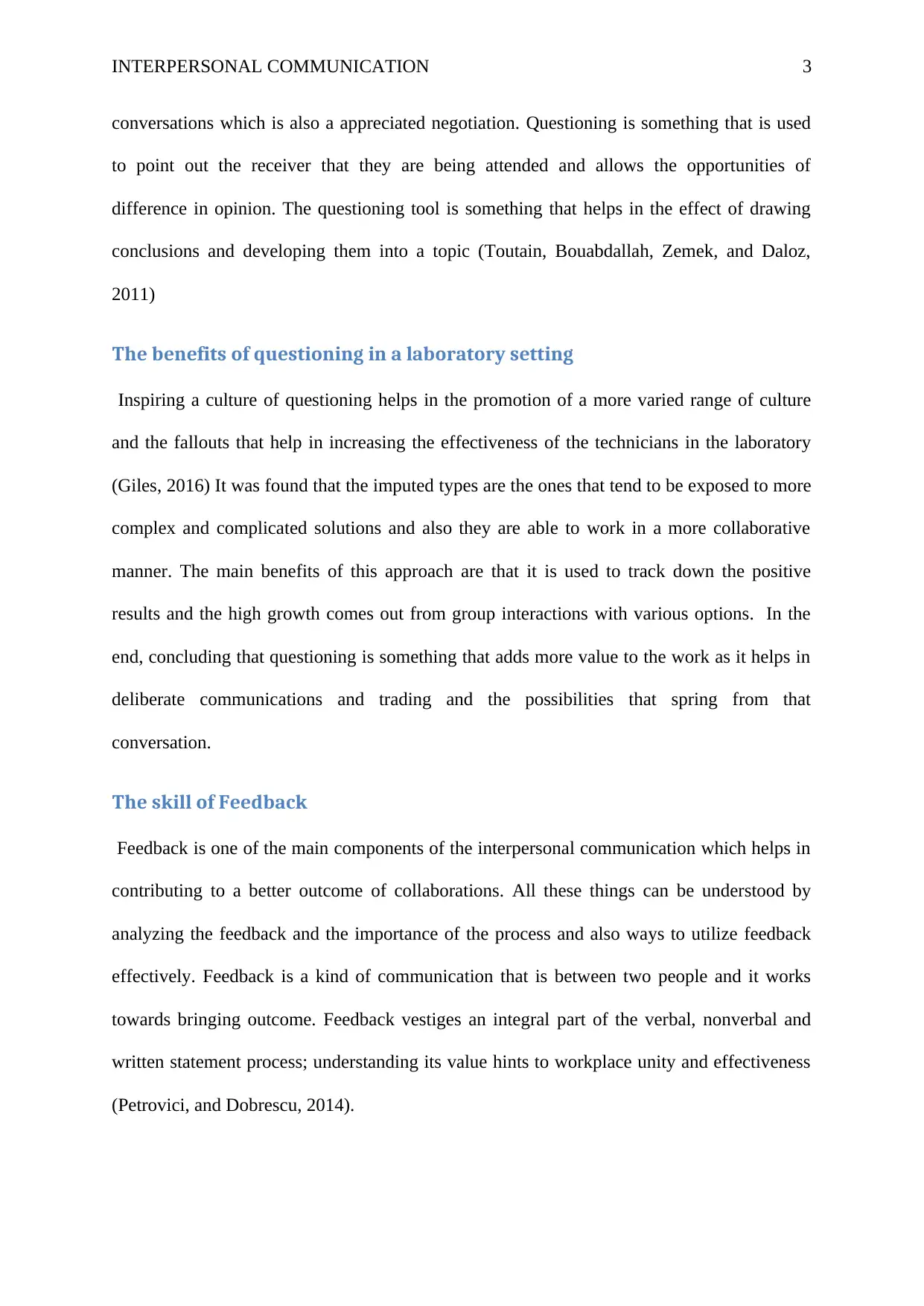
INTERPERSONAL COMMUNICATION 3
conversations which is also a appreciated negotiation. Questioning is something that is used
to point out the receiver that they are being attended and allows the opportunities of
difference in opinion. The questioning tool is something that helps in the effect of drawing
conclusions and developing them into a topic (Toutain, Bouabdallah, Zemek, and Daloz,
2011)
The benefits of questioning in a laboratory setting
Inspiring a culture of questioning helps in the promotion of a more varied range of culture
and the fallouts that help in increasing the effectiveness of the technicians in the laboratory
(Giles, 2016) It was found that the imputed types are the ones that tend to be exposed to more
complex and complicated solutions and also they are able to work in a more collaborative
manner. The main benefits of this approach are that it is used to track down the positive
results and the high growth comes out from group interactions with various options. In the
end, concluding that questioning is something that adds more value to the work as it helps in
deliberate communications and trading and the possibilities that spring from that
conversation.
The skill of Feedback
Feedback is one of the main components of the interpersonal communication which helps in
contributing to a better outcome of collaborations. All these things can be understood by
analyzing the feedback and the importance of the process and also ways to utilize feedback
effectively. Feedback is a kind of communication that is between two people and it works
towards bringing outcome. Feedback vestiges an integral part of the verbal, nonverbal and
written statement process; understanding its value hints to workplace unity and effectiveness
(Petrovici, and Dobrescu, 2014).
conversations which is also a appreciated negotiation. Questioning is something that is used
to point out the receiver that they are being attended and allows the opportunities of
difference in opinion. The questioning tool is something that helps in the effect of drawing
conclusions and developing them into a topic (Toutain, Bouabdallah, Zemek, and Daloz,
2011)
The benefits of questioning in a laboratory setting
Inspiring a culture of questioning helps in the promotion of a more varied range of culture
and the fallouts that help in increasing the effectiveness of the technicians in the laboratory
(Giles, 2016) It was found that the imputed types are the ones that tend to be exposed to more
complex and complicated solutions and also they are able to work in a more collaborative
manner. The main benefits of this approach are that it is used to track down the positive
results and the high growth comes out from group interactions with various options. In the
end, concluding that questioning is something that adds more value to the work as it helps in
deliberate communications and trading and the possibilities that spring from that
conversation.
The skill of Feedback
Feedback is one of the main components of the interpersonal communication which helps in
contributing to a better outcome of collaborations. All these things can be understood by
analyzing the feedback and the importance of the process and also ways to utilize feedback
effectively. Feedback is a kind of communication that is between two people and it works
towards bringing outcome. Feedback vestiges an integral part of the verbal, nonverbal and
written statement process; understanding its value hints to workplace unity and effectiveness
(Petrovici, and Dobrescu, 2014).
Paraphrase This Document
Need a fresh take? Get an instant paraphrase of this document with our AI Paraphraser
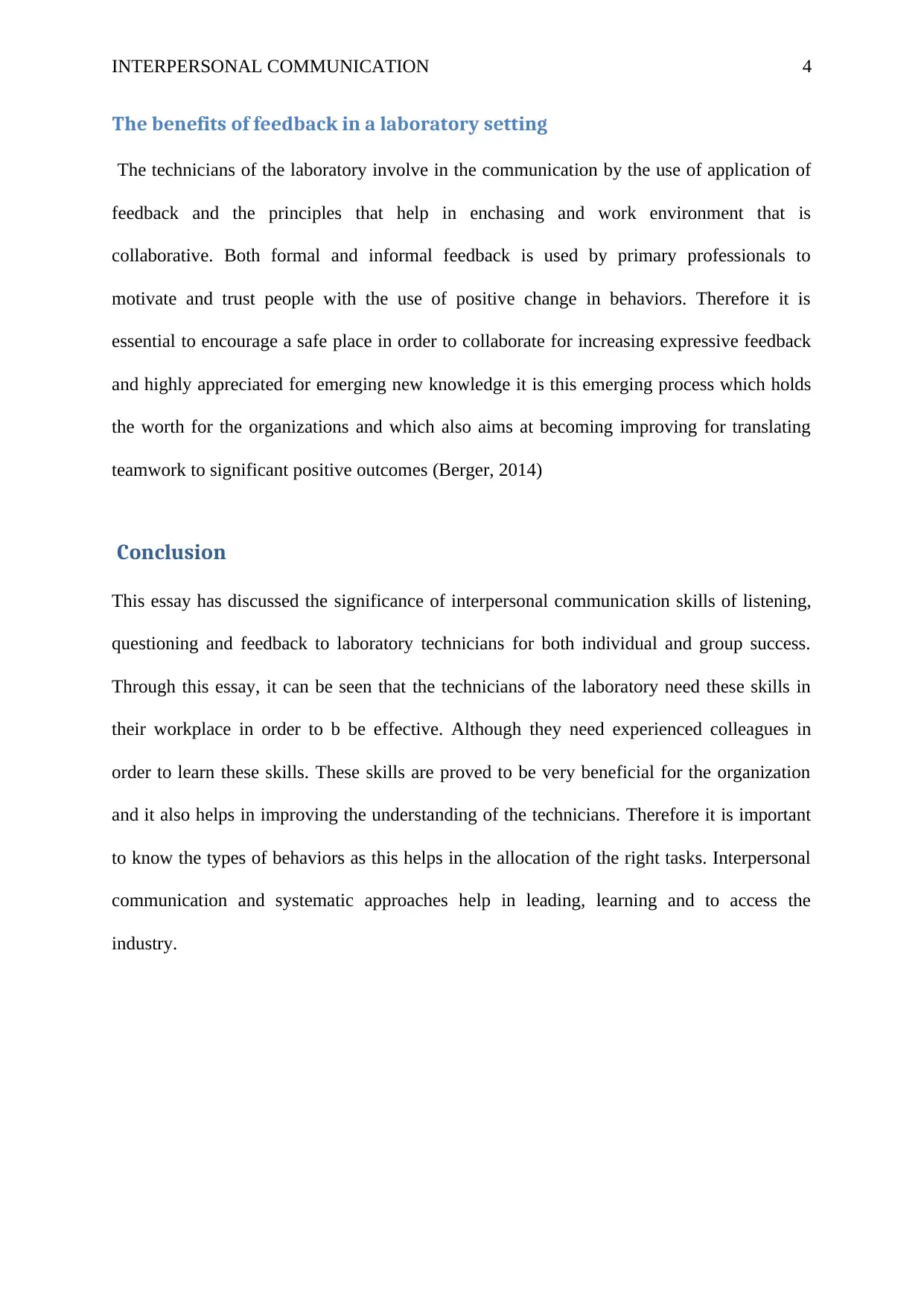
INTERPERSONAL COMMUNICATION 4
The benefits of feedback in a laboratory setting
The technicians of the laboratory involve in the communication by the use of application of
feedback and the principles that help in enchasing and work environment that is
collaborative. Both formal and informal feedback is used by primary professionals to
motivate and trust people with the use of positive change in behaviors. Therefore it is
essential to encourage a safe place in order to collaborate for increasing expressive feedback
and highly appreciated for emerging new knowledge it is this emerging process which holds
the worth for the organizations and which also aims at becoming improving for translating
teamwork to significant positive outcomes (Berger, 2014)
Conclusion
This essay has discussed the significance of interpersonal communication skills of listening,
questioning and feedback to laboratory technicians for both individual and group success.
Through this essay, it can be seen that the technicians of the laboratory need these skills in
their workplace in order to b be effective. Although they need experienced colleagues in
order to learn these skills. These skills are proved to be very beneficial for the organization
and it also helps in improving the understanding of the technicians. Therefore it is important
to know the types of behaviors as this helps in the allocation of the right tasks. Interpersonal
communication and systematic approaches help in leading, learning and to access the
industry.
The benefits of feedback in a laboratory setting
The technicians of the laboratory involve in the communication by the use of application of
feedback and the principles that help in enchasing and work environment that is
collaborative. Both formal and informal feedback is used by primary professionals to
motivate and trust people with the use of positive change in behaviors. Therefore it is
essential to encourage a safe place in order to collaborate for increasing expressive feedback
and highly appreciated for emerging new knowledge it is this emerging process which holds
the worth for the organizations and which also aims at becoming improving for translating
teamwork to significant positive outcomes (Berger, 2014)
Conclusion
This essay has discussed the significance of interpersonal communication skills of listening,
questioning and feedback to laboratory technicians for both individual and group success.
Through this essay, it can be seen that the technicians of the laboratory need these skills in
their workplace in order to b be effective. Although they need experienced colleagues in
order to learn these skills. These skills are proved to be very beneficial for the organization
and it also helps in improving the understanding of the technicians. Therefore it is important
to know the types of behaviors as this helps in the allocation of the right tasks. Interpersonal
communication and systematic approaches help in leading, learning and to access the
industry.
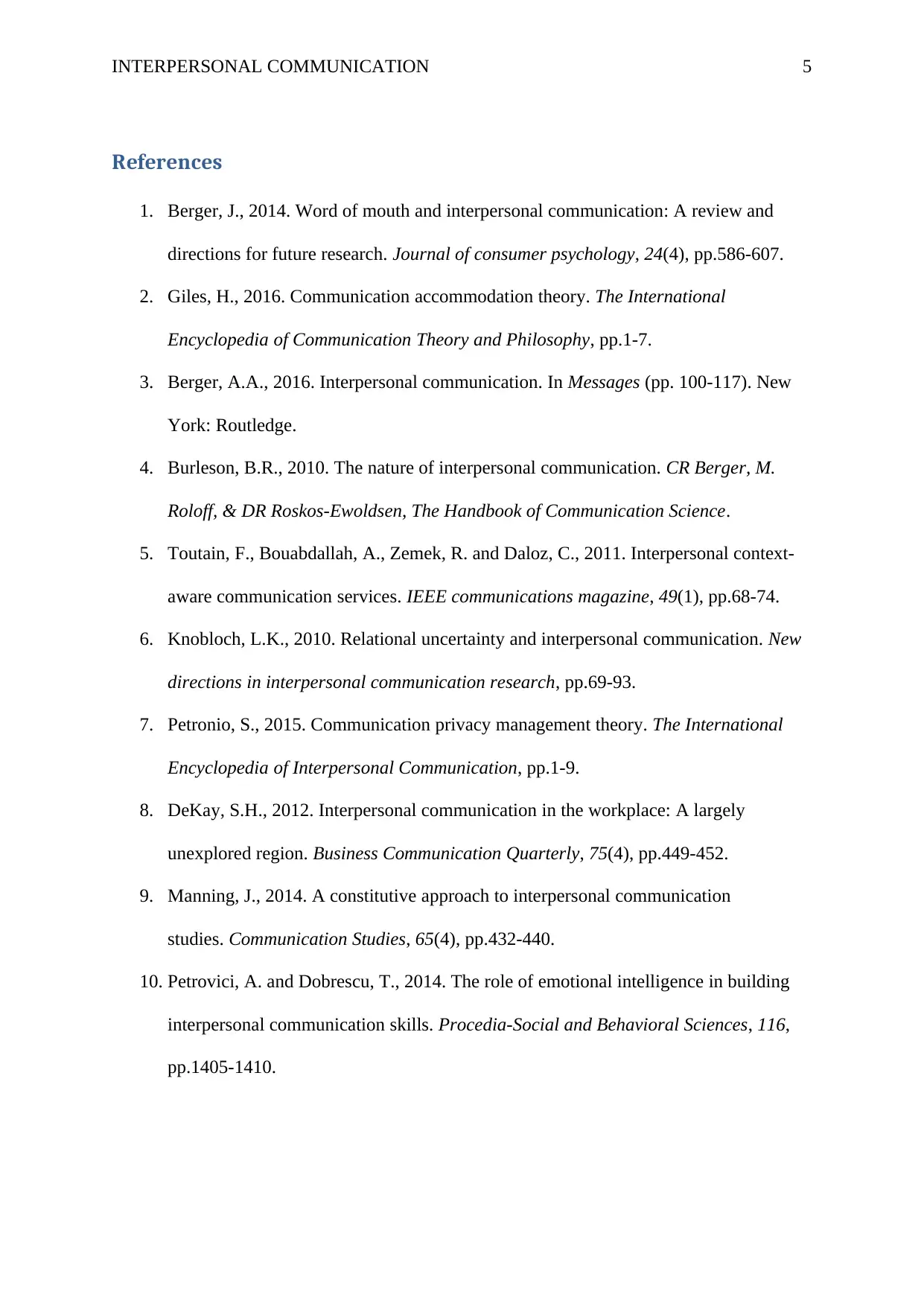
INTERPERSONAL COMMUNICATION 5
References
1. Berger, J., 2014. Word of mouth and interpersonal communication: A review and
directions for future research. Journal of consumer psychology, 24(4), pp.586-607.
2. Giles, H., 2016. Communication accommodation theory. The International
Encyclopedia of Communication Theory and Philosophy, pp.1-7.
3. Berger, A.A., 2016. Interpersonal communication. In Messages (pp. 100-117). New
York: Routledge.
4. Burleson, B.R., 2010. The nature of interpersonal communication. CR Berger, M.
Roloff, & DR Roskos-Ewoldsen, The Handbook of Communication Science.
5. Toutain, F., Bouabdallah, A., Zemek, R. and Daloz, C., 2011. Interpersonal context-
aware communication services. IEEE communications magazine, 49(1), pp.68-74.
6. Knobloch, L.K., 2010. Relational uncertainty and interpersonal communication. New
directions in interpersonal communication research, pp.69-93.
7. Petronio, S., 2015. Communication privacy management theory. The International
Encyclopedia of Interpersonal Communication, pp.1-9.
8. DeKay, S.H., 2012. Interpersonal communication in the workplace: A largely
unexplored region. Business Communication Quarterly, 75(4), pp.449-452.
9. Manning, J., 2014. A constitutive approach to interpersonal communication
studies. Communication Studies, 65(4), pp.432-440.
10. Petrovici, A. and Dobrescu, T., 2014. The role of emotional intelligence in building
interpersonal communication skills. Procedia-Social and Behavioral Sciences, 116,
pp.1405-1410.
References
1. Berger, J., 2014. Word of mouth and interpersonal communication: A review and
directions for future research. Journal of consumer psychology, 24(4), pp.586-607.
2. Giles, H., 2016. Communication accommodation theory. The International
Encyclopedia of Communication Theory and Philosophy, pp.1-7.
3. Berger, A.A., 2016. Interpersonal communication. In Messages (pp. 100-117). New
York: Routledge.
4. Burleson, B.R., 2010. The nature of interpersonal communication. CR Berger, M.
Roloff, & DR Roskos-Ewoldsen, The Handbook of Communication Science.
5. Toutain, F., Bouabdallah, A., Zemek, R. and Daloz, C., 2011. Interpersonal context-
aware communication services. IEEE communications magazine, 49(1), pp.68-74.
6. Knobloch, L.K., 2010. Relational uncertainty and interpersonal communication. New
directions in interpersonal communication research, pp.69-93.
7. Petronio, S., 2015. Communication privacy management theory. The International
Encyclopedia of Interpersonal Communication, pp.1-9.
8. DeKay, S.H., 2012. Interpersonal communication in the workplace: A largely
unexplored region. Business Communication Quarterly, 75(4), pp.449-452.
9. Manning, J., 2014. A constitutive approach to interpersonal communication
studies. Communication Studies, 65(4), pp.432-440.
10. Petrovici, A. and Dobrescu, T., 2014. The role of emotional intelligence in building
interpersonal communication skills. Procedia-Social and Behavioral Sciences, 116,
pp.1405-1410.
⊘ This is a preview!⊘
Do you want full access?
Subscribe today to unlock all pages.

Trusted by 1+ million students worldwide
1 out of 6
Related Documents
Your All-in-One AI-Powered Toolkit for Academic Success.
+13062052269
info@desklib.com
Available 24*7 on WhatsApp / Email
![[object Object]](/_next/static/media/star-bottom.7253800d.svg)
Unlock your academic potential
Copyright © 2020–2026 A2Z Services. All Rights Reserved. Developed and managed by ZUCOL.





